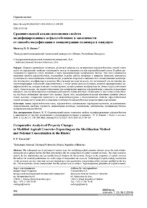Сравнительный анализ изменения свойств модифицированных асфальтобетонов в зависимости от способа модификации и концентрации полимера в вяжущем
Another Title
Comparative Analysis of Property Changes in Modified Asphalt Concretes Depending on the Modification Method and Polymer Concentration in the Binder
Bibliographic entry
Яцевич, П. П. Сравнительный анализ изменения свойств модифицированных асфальтобетонов в зависимости от способа модификации и концентрации полимера в вяжущем = Comparative Analysis of Property Changes in Modified Asphalt Concretes Depending on the Modification Method and Polymer Concentration in the Binder / П. П. Яцевич // Наука и техника. – 2024. – № 2. – С. 140-150.
Abstract
Широкое применение полимеров различной природы для модификации асфальтобетонных смесей ставит задачу по определению наиболее оптимального метода их введения в состав асфальтобетонной смеси. В работе рассматриваются варианты сухого введения и через предварительную модификацию битума. При этом оцениваются изменения свойств асфальтобетонов, отражающих условия работы материала в широком диапазоне температур, и учитываются технологические особенности при устройстве покрытия в зависимости от количественной концентрации полимерного модификатора в вяжущем. Исследования наглядно показали, что оптимальной для достижения высокотемпературных показателей асфальтобетонов, с точки зрения расхода полимера, является предварительная модификация битума, которая позволяет оптимизировать распространение модификатора по объему асфальтобетонной смеси. Также показано, что предпочтительными для модификации являются асфальтобетоны с высоким содержанием вяжущего, так как битум является основным компонентом взаимодействия с полимерами и, чем толще пленка битума, тем более оптимально протекает этот процесс. Кроме того, исследования показали негативное влияние относительно высокого содержания термопласта на низкотемпературные и технологические свойства асфальтобетонных смесей, которые могут приводить к снижению устойчивости асфальтобетона к коррозионным разрушениям.
Abstract in another language
The widespread use of polymers of various types for modifying asphalt concrete mixtures poses the task of determining the most optimal method for their introduction into the composition of asphalt concrete mixtures. The study considers options for dry introduction and pre-modification of bitumen. In this context, changes in the properties of asphalt concrete that reflect the material performance in a wide range of temperature are assessed. Technological aspects during construction of the pavement are also taken into account, depending on the quantitative concentration of the polymer modifier in the binder. The research has clearly demonstrated that the optimal way to achieve high-temperature properties of asphalt concrete, in terms of polymer consumption, is pre-modification of bitumen, which allows optimizing the distribution of the modifier throughout the volume of the asphalt concrete mixture. Additionally, the research has shown that asphalt concretes with a high binder content are preferable for modification because bitumen is the primary component in interaction with polymers, and the thicker the bitumen film, the more optimally this process occurs. In addition, the studies have revealed the negative influence of relatively high thermoplastic content on the low-temperature and technological properties of asphalt concrete mixtures, which can lead to a decrease in the resistance of asphalt concrete to corrosion damage.
View/
Collections
- № 2[9]

